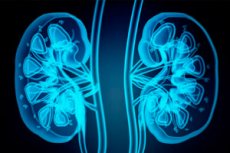New therapy appears effective against kidney transplant rejection
最近審查:14.06.2024

Antibody-mediated rejection (AMR) is one of the most common causes of kidney transplant failure. However, no treatment has yet been found that can effectively combat this complication in the long term.
In an international and interdisciplinary clinical study led by Georg Böhming and Katharina Mayer from the Clinical Department of Nephrology and Dialysis of the Faculty of Medicine III of the Medical University of Vienna and the University Hospital of Vienna, a new therapeutic principle in transplantation medicine has been found that is safe and highly effective. The results were recently published in the New England Journal of Medicine.
The study included 22 patients who were diagnosed with AMR after a kidney transplant at the Vienna University Hospital and the Charité–Universitätsmedizin Berlin between 2021 and 2023. In a randomized, double-blind, placebo-controlled study, patients were given either the drug felsartamab or a drug with no pharmacological effect (placebo).
Felzartamab is a specific (monoclonal CD38) antibody originally developed as an immunotherapy to treat multiple myeloma by killing tumor cells in the bone marrow.
“Due to its unique ability to influence immune responses, felzartamab has also attracted attention in transplant medicine,” explains study leader Boehming, noting that recent developments are largely due to his initiative.
“Our goal was to evaluate the safety and efficacy of the antibody as a potential treatment option for AMR after kidney transplant,” adds first author Mayer.
After a six-month treatment period and an equivalent follow-up period, the researchers were able to report encouraging results: morphological and molecular analysis of graft biopsies showed that felsartamab has the potential to effectively and safely combat AMR in renal grafts.
With approximately 330 transplants performed annually, kidney transplantation is the most common form of organ transplantation in Austria. AMR is one of the most common complications that occurs when the organ recipient's immune system produces antibodies against the foreign organ. This can lead to loss of kidney function, often requiring further dialysis or repeat transplantation.
Treatment of AMR is necessary not only for the health of patients, but also for the efficient use of donor organs, which are already in limited supply. “The results of our study could be a breakthrough in the treatment of kidney transplant rejection,” says Mayer.
“Our findings also give hope that felzartamab may counteract the rejection of other donor organs, such as the heart or lungs. Xenotransplantation using genetically modified pig organs may also become a reality,” adds Böhming.
This interdisciplinary phase II study, the first clinical trial demonstrating an effective treatment for late AMR, was conducted in collaboration with several departments of the Faculty of Medicine of the University of Vienna and the University Hospital of Vienna, including the Department of Clinical Pharmacology (Bernd Gilma).
The study also involved international partners such as Charité–Universitätsmedizin Berlin (Clemens Budde), University Hospital Basel, University of Alberta, Canada, and US startup Human Immunology Biosciences, among others. The next step, which is important for drug approval, is validation of the results in a multicenter phase III study, which is currently planned based on the current study results.

